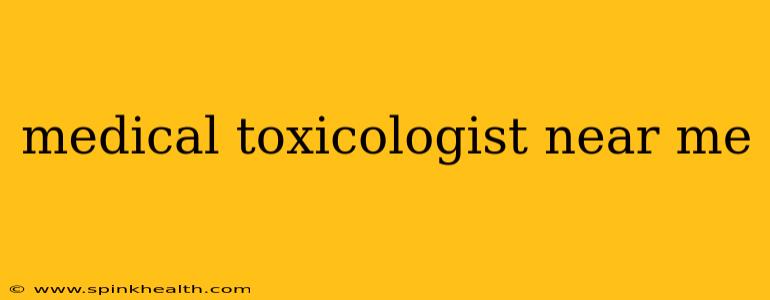Finding the right medical professional can feel like navigating a maze, especially when dealing with a complex issue like toxicology. If you're searching for a "medical toxicologist near me," this guide will help you understand what to look for and how to find the best care. Let's embark on this journey together.
Imagine this: You've encountered a concerning exposure to a potentially harmful substance. Perhaps it was an accidental ingestion, an occupational hazard, or even a deliberate act. Panic sets in. You need answers, fast. But where do you turn?
That's where the expertise of a medical toxicologist becomes invaluable. These specialists possess a deep understanding of how toxins affect the human body, and they're equipped to diagnose, treat, and manage the effects of poisonings.
What is a Medical Toxicologist?
A medical toxicologist is a physician with specialized training in toxicology – the study of poisons and their effects. They don't just treat the immediate symptoms; they delve into the intricate mechanisms of toxicity, identifying the substance involved, assessing the severity of the exposure, and developing a tailored treatment plan. Their expertise extends beyond emergency situations; they also manage long-term effects of toxic exposures.
How to Find a Medical Toxicologist Near Me?
Finding the right medical toxicologist near you involves a strategic approach. Here's a step-by-step guide:
-
Online Search: Start with a simple online search: "medical toxicologist near me" or "poison control center near me". This often yields a list of local hospitals or clinics with toxicology departments.
-
Hospital Websites: Many major hospitals have dedicated toxicology departments or collaborate with toxicologists. Check the websites of hospitals in your area to see if they list toxicology specialists on their staff.
-
Physician Referral Networks: Your primary care physician (PCP) or another specialist you're already seeing can often recommend a qualified medical toxicologist. Their insights into your medical history can help them make a suitable referral.
-
Poison Control Center: If your situation is urgent, the Poison Control Center is your first point of contact. They provide immediate advice and can often direct you to the nearest medical toxicologist or appropriate emergency facility.
What Qualifications Should I Look For?
When choosing a medical toxicologist, consider these crucial qualifications:
- Board Certification: Look for board certification in toxicology. This indicates the doctor has met stringent educational and examination requirements.
- Experience: A seasoned medical toxicologist will have extensive experience in diagnosing and treating a wide range of poisonings.
- Hospital Affiliation: Affiliation with a reputable hospital demonstrates a commitment to quality care and access to advanced diagnostic tools and treatment options.
What if I Need Immediate Help?
If you are experiencing a medical emergency related to a toxic exposure, call 911 or your local emergency services immediately. Do not delay. Time is critical in many poisoning cases.
What Questions Should I Ask a Potential Medical Toxicologist?
Choosing a healthcare provider is a personal decision. Asking the right questions ensures you feel comfortable and confident in your choice.
What are your qualifications and experience in treating [specific type of poisoning, if applicable]?
This helps you understand the doctor's expertise in handling your particular situation.
What is your approach to managing the long-term effects of toxic exposures?
This is crucial if you are concerned about potential long-term health consequences.
What are your fees and payment policies?
Understanding the financial aspects upfront avoids unexpected surprises.
How do I Prepare for my Appointment?
Before your appointment, gather as much information as possible about the suspected exposure, including:
- The substance involved: Be as specific as possible.
- The route of exposure: Was it ingested, inhaled, or absorbed through the skin?
- The amount of exposure: An estimate, if possible.
- The time of exposure: This is vital for treatment.
By following these steps, you can effectively find a qualified medical toxicologist near you and receive the expert care you need. Remember, seeking help early is key to successful treatment and recovery from toxic exposure.

